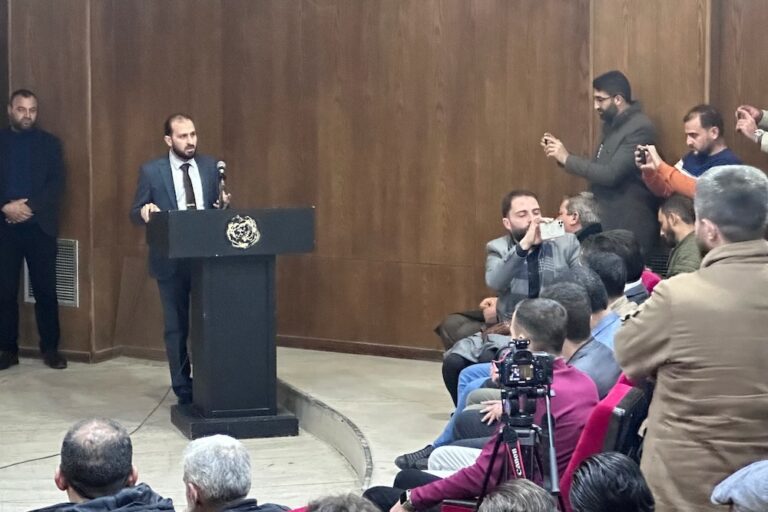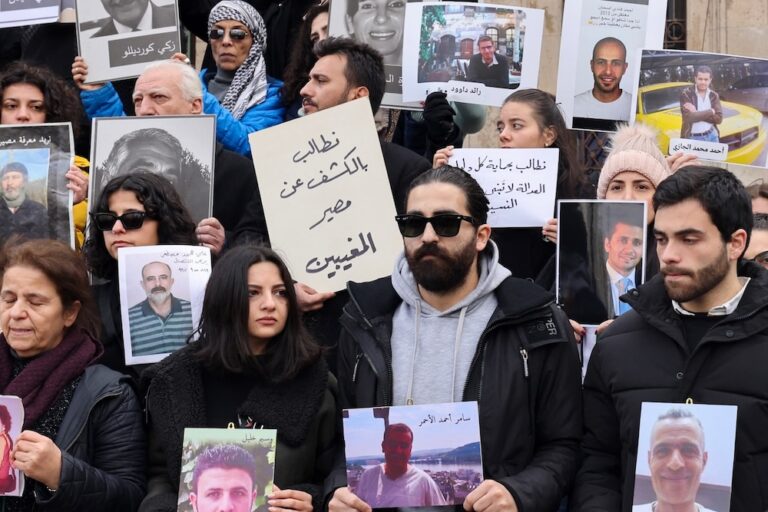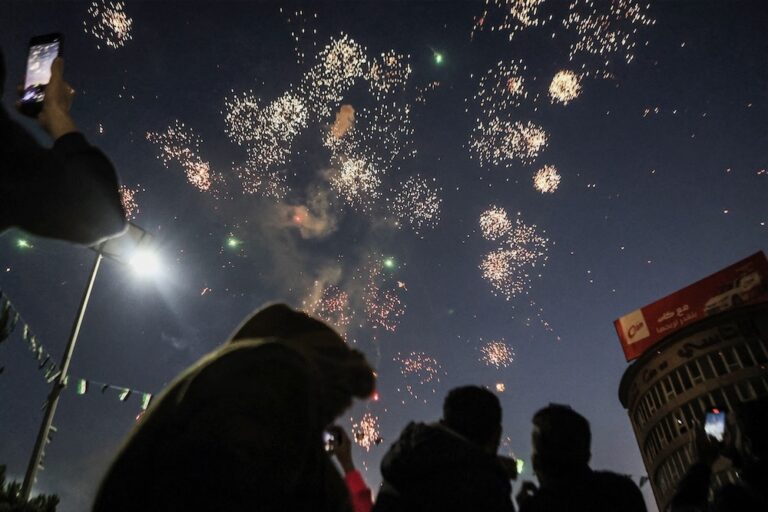(WiPC/IFEX) – The WiPC is currently staging a campaign on behalf of Nizar Nayouf, detained in Syria. The following is a description of the situation in Syria, and an excerpt of an extremely moving interview with Faraj Bayraqdar, the Syrian poet who was freed last year following many years in prison: Syria under human rights […]
(WiPC/IFEX) – The WiPC is currently staging a campaign on behalf of Nizar Nayouf, detained in Syria. The following is a description of the situation in Syria, and an excerpt of an extremely moving interview with Faraj Bayraqdar, the Syrian poet who was freed last year following many years in prison:
Syria under human rights scrutiny
by the Writers in Prison Committee of International PEN
(April 2, 2001) – At the end of March 2001, the Syrian government was brought before the United Nations Committee on Human Rights in New York to discuss its record on human rights abuses. Despite an extensive presidential amnesty announced in July 2000, which was welcomed by human rights organizations, Syria continues to act in violation of the International Covenant on Civil and Political Rights, to which it is a signatory.
Last year Amnesty International registered its concern about the number of political prisoners still held in Syrian prisons (thought to be around 1,500), and at the continued infringement of the rights of former political prisoners. The government was also criticized by Human Rights Watch in February for its clampdown on independent civil forums that have invigorated the country’s political life. International PEN is currently monitoring the cases of three journalists who remain imprisoned for the peaceful exercise of their freedom of expression.
One of these cases is that of journalist Nizar Nayouf, who has served nine years of a ten-year prison term. He was arrested in January 1992 for his membership of the banned Committee for the Defence of Democratic Freedoms and Human Rights (CDF), and for “disseminating false information” via the organization’s monthly newsletter, of which he was editor-in-chief. Nayouf is held in solitary confinement in Mezze Prison, Damascus, and there are grave concerns for his health. Prison authorities have apparently refused to administer urgent medical treatment to Nayouf unless he pledges to refrain from political activity and states that he made “false declarations concerning the situation of human rights in Syria.” His health has been further affected by a hunger strike which he had staged in protest at a ban on family visits imposed in November 2000. It is feared that he may not survive the final year of his sentence.
Another of International PEN’s cases, Faraj Ahmad Bayrakdar (sometimes spelled Birqdar), a poet and journalist who was released under last year’s amnesty, spoke of the terrible conditions in prison and of the torture he suffered there. He left jail 14 months before the end of a 15-year jail sentence which was handed down for his political activities and membership of the League of Communist Action. On his release, the Lebanese newspaper An Nahar published an interview with Bayrakdar in which he discussed his experiences:
“Poetry allowed me to control my prison and not vice versa. I tried to be careful, to avoid falling into being overly direct… There were two words, though, that I never feared to use: captivity and freedom. They contain a charge that never withers. I can also say that I never wrote about my pain, but about the pain of people around me. The tragedy of prison doesn’t only impinge on the prisoner, but on life outside jail: many families of prisoners were destroyed, by divorces, poverty, misery.”
International PEN members worldwide are campaigning towards the release of Nizar Nayouf, who is detained solely for the peaceful exercise of his right to freedom of expression.
Poetry as a defense mechanism: interview with Faraj Bayrakdar
Introduction by Siobhan Dowd, with the cooperation of the Writers in Prison Committee of International PEN
(April 2, 2001) – Last year, on November 16, 2000, the Syrian poet Faraj Bayrakdar (sometimes spelt Birqdar) was freed from prison in an amnesty granted by President Bashar Al Assad. He left jail 14 months before the end of his 15-year jail term without being obliged to renounce his political beliefs. He had been profiled by DFN as one of the world’s “forgotten prisoners.” Detained in 1987 for his political activities and membership of the League of Communist Action, he had published three books before being arrested. A further title, a collection of his poems, was published during his long imprisonment.
In a phone call to friends in Paris, Bayrakdar reported that his health was better; he was walking better (he had sustained injuries some years ago, after having been subjected to torture in prison); and was resting at home with his parents, brother and only daughter. In a press statement, he said he did not know “how to express my gratitude to⦠hundreds of friends who have helped me to pass from the river of nightmare to that of a dream. Certain detained journalists and myself have benefited from the particular attention of⦠numerous organizations and personalities. This has allowed us to escape the grasp of forgetfulness, this symbolic death that so menaces prisoners.”
The Lebanese newspaper An Nahar conducted a detailed interview with him, a portion of which is reprinted below.
Q: Did you fear that jail would control your poetry by trapping it in a form of directness and making it lose some of its aesthetic and literary value?
F.B.: Poetry is democratic for both its writer and reader. It never compromised my feelings but rather gave me a space for a surprising and vast freedom. Poetry allowed me to control my prison, not the other way around. I tried to be careful, to avoid falling into being overly direct. I think what protected me was that I avoided writing about big political struggles while in jail. What remained was my longing for my daughter, my mother, for the village where I grew up. These are the themes which imprisonment arouses, they are far from direct or obvious, and they never lose their allure. There were two words, though, I never feared to use: captivity and freedom. They contain a charge that never withers. I can also say that I never wrote about my pain, but about the pain of people around me. The tragedy of prison doesn’t only impinge on the prisoner, but on life outside jail: many families of prisoners were destroyed, by divorces, poverty, misery.
Q: What helped you to resist your imprisonment? Was it your ideological convictions or was there also a human, personal dimension to it?
F.B.: I think I owe my resistance to a variety of concepts. Love is one of them. Poetry. Despair also, but not in the sense of suicide or surrender. Sadness was also present. There was also an ethical dimension. I was raised to be unbreakable, there was no choice but to resistâ¦
Q: Can you tell us what was the most painful torture method?
F.B.: What mattered was to bear the pain until I fainted. What comforted me was that I didn’t tell them anything. After I passed out, it became impossible to take anything from me. They studied carefully what was the limit, the edge between life and death, and they would stop slightly before it. For me, what they call the “German chair” and what I call the “Nazi chair” was the most painful, especially its later consequences, like pains in the back and a temporary loss of movement in the arms that lasted for months. I was once subjected to it for two whole hours. (The German chair is made of metal, the prisoner is tied to it, then the chair is folded backwards, so that it pressurizes the back of the prisoner, arched to its maximum.) When the prisoner is put on that chair, the world life and death becomes half an exhalation and half an inhalation, any full breath can kill him. He has to calibrate his breathing on the edge of pain between two half-breaths. His life is placed on that line.
Q: How did you return to poetry?
F.B.: â¦Poetry came by itself, as a defense mechanism. I thought of ways to write without a pen and paper. So I said to myself “I’ll try to pass the time by composing small paragraphs that I can remember. For instance, a song for my mother⦠Once they had to carry me back to my cell on a blanket and on the way, I had this vision of Malek Bin Arrayb when it was his time to die. I felt the similarities between him and me. I didn’t fear death, I was only sad, so I composed this verse:
I wasn’t alive
And I wasn’t dead
So I made my way for him
Oh, how the narrowness of this place
Shames me.
Q: How long did it stay in your mind?
F.B.: My memory became trained, even if this mechanism didn’t allow for long poems. In Tadmor too there are no pens or papers allowed, but I trained my memory even more and I counted on a few comrades to memorize some passages⦠The first time I wrote “Vision” I was in Tadmor: they had given me a pen to write down the names of some medicines we used. So I took my chance and wrote down the poems on cigarette papers. But I quickly destroyed them again, as we were thoroughly searched. Then we got more experienced and less fearful and we invented an ink from tea and onion leaves, and we used a wood splinter we found in the yard as a pen.
Q: Did you hate your torturer? Haven’t you ever wondered where the human being inside him was?
F.B.: Sometimes during the periods of torture I used to sympathize with some of the torturers. It was obvious to me they were doing a job imposed on them. As soon as the officer went out of the room, they would whisper something in your ear or go easy on the beating. At the end of the day, though, they are part of my people and they are destroying my people. They destroy the prison, they destroy the torturer, they even destroy the citizen outside the prison. Today, after my release, I find I can forgive all the torturers who were simple soldiers, but I despise some of the officers and I’m not willing to ever deal with them again.


